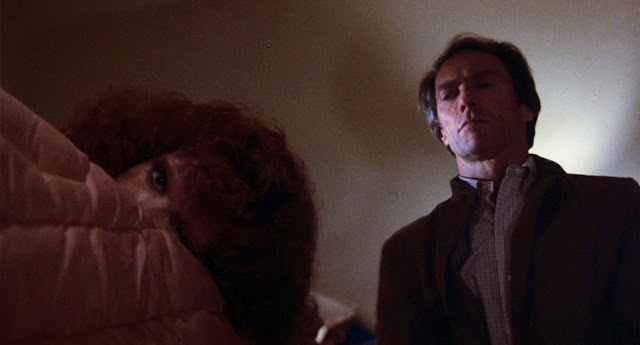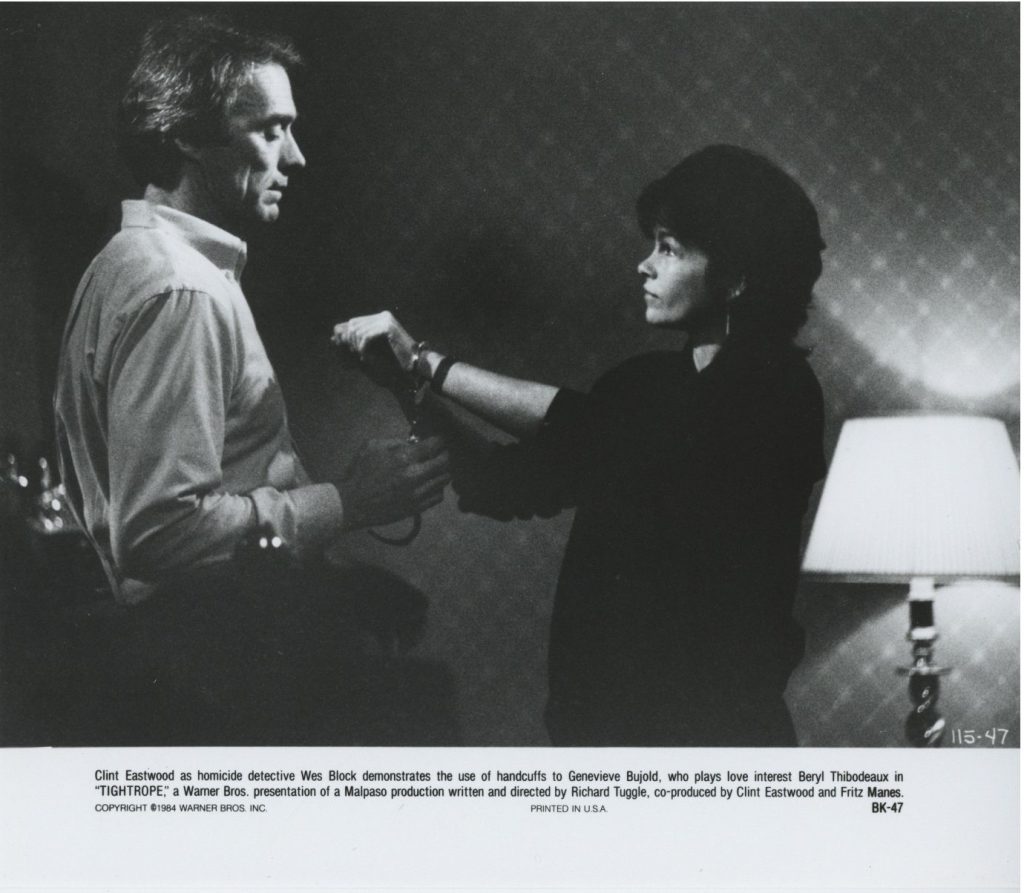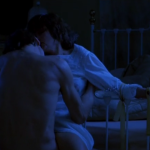Tightrope (IMDB) is a 1984 thriller starring Clint Eastwood and Genevieve Bujold. It’s very much of the “woman in peril” genre: New Orleans detective Wes Block (Eastwood) tracks a killer of sex workers.

We’re introduced to Wes (Eastwood) as a single father of two girls (and a lot of stray dogs), his wife having left him for a wealthier man. Wes has a darker side too, prowling around the red light district of New Orleans, meeting sex workers for more than just police business. These are hypersexualized scenes, with little or no attempt to humanize these women or explore why they do what they do.
Meanwhile, the faceless killer is shadowing him, and many of the killer’s sex worker victims are (or are implied to be) women that Wes has seen. Wes keeps losing things like his handcuffs or his necktie that turn up near the victims’s corpses.

Placed in charge of a police task force, Wes instructs the group to check for any sexual crimes, from exhibitionism to bestiality. Later, he tells reporters: “So far, the victims have all been women linked to unusual or aberrant sexual activity.” This suggests that all forms of deviant sexuality, from bisexuality to sex work to murder, are part of the same thing, that a person who does one might just as easily do another.
Beryl (Bujold) as a character doesn’t do much to advance the plot of the investigation. She serves as a contrast to the hypersexualized women of Wes’ nighttime excursions, with a short-haired, minimal-makeup, blazer style. She runs a rape relief center and teaches self-defense classes. Wes is initially hostile to her for pressuring the mayor’s office for action on the sex worker murders (which may be why there’s a task force on the killings), but then he warms up to her and they have a very vanilla date, including meeting his kids.
Beryl: “Do you investigate many sexual crimes?”
Wes: “Why?”
Beryl: “I was wondering if they’ve had any effect on you.”
Wes: “Well, they did make me want to treat my wife a little more tenderly.”
Beryl: “How did she respond?”
Wes: “She said she wasn’t interested in tenderness.”
Beryl figures out that Wes and the sex worker they see in a parade knew each other, and Wes admits he started seeing prostitutes after his wife left.

Things take a turn when, in Wes’ bedroom, Beryl sees Wes’ handcuffs on the nightstand,
Beryl: “Now why do you think he [the killer] uses handcuffs?”
Wes: “Control.”
Beryl: “Do you use them very often?”
Wes: “Well, it depends.”
Beryl: “On what?”
Wes: “The situation.”
Beryl: “When you feel you are threatened?”Wes: “Yeah, you could say that.”
Beryl: “With these, no one can get to you, huh?”
Wes: “They’ll stop just about anyone.”
Beryl puts a handcuff on her own wrist, then raises her hands to him, to be cuffed. He uses the key to take them off her and drops them on the floor. She tries to touch his face, but he flinches away. Moments ago, Wes was quite at ease with her, but now he takes the handcuffs off and shuts down.
While Wes and Beryl sleep in different rooms, the killer invades house and strangles Beryl in her bed. She pulls off the mask to reveal Wes’ face. This is revealed to be Wes’ dream. Wes (and the film) can’t handle the idea of a liberated woman who has submissive/masochistic fantasies, the overlap of the two sides of Wes’ character.
A message from the killer sends Wes to “Sam’s”, which appears to be a house of domination.
Wes walks into a room, and a woman who walks in immediately slaps him in the face. Then she turns it around and says, “I love being punished by strong men.” She picks up a bullwhip and offers it. “He said you’d want this.” “What for?” “Me.” “He’s wrong.” She slaps Wes again. “He said you were just like him.” “Who’s he?” She slaps him again, but he grabs her hand. “Use the whip.” He throws it away. She pins a black rose on his lapel, also as instructed, and tells him to go to “Praline’s.”
Praline’s is a gay bar. Wes immediately stands next to a leatherman, and gets checked out by another guy with a black rose. The hustler with the rose approaches him.
Hustler: “He bought me for you. You don’t want it?”
Wes: “No.”
Hustler: “He said you did. You just don’t know it yet.”
Wes: “Well, he’s wrong.”
Hustler: “How do you know if you haven’t tried it?”
Wes: “Maybe I have.”
After this evasion, Wes follows a lead to a warehouse where the hustler was supposed to meet “him” and get payment. Instead, he finds the hustler dead by hanging. This is the killer’s only male victim, but it otherwise fits the pattern of killing people who represent the temptations of deviant sexuality.
It’s pretty transparent that the killer is Wes’ Jungian Shadow, representing all the traits Wes has disavowed in himself, killing the women (and men) who tempt him away from his definition of normality. He dreams of being the killer and strangling Beryl.
When we finally see the killer, it’s clear that he’s wearing a black leather bondage hood, firmly linking him to the world of deviant sexuality.
I get the impression from this and other films that filmmakers include sadomasochistic acts and objects without a clear understanding of how sadomasochism works in the real world. They’re just there as a shorthand way of indicating a character’s moral depravity or decadence. Wes’ domineering/sadistic desires are presented as something he must keep separate from his family and professional life.
What’s particularly puzzling is the implied backstory between Wes and his wife, and his comment about “wanting to treat her more tenderly” and her response that she “isn’t interested in tenderness.” Does this mean that his exposure to the aftermath of sexual violence in his work make him want more “tenderness” at home, which in turn made his wife lose sexual interest in him? Did she only want him with the “hard” masculinity of Eastwood’s “Dirty Harry” and other roles? That would mean her rejection drove Wes to repress all of his sexuality into this secret life, at least until Beryl comes along. Beryl would seem to solve this problem by appreciating both sides of Wes’ personality, attracted to both his nurturing parental qualities and his hard, domineering qualities. Yet, Wes can’t accept that the two qualities can exist in the same person.
So, is the problem women with their confusing and contradictory demands on men, or is it men who are unable to manage more complicated gender roles, switching from loving father to professional worker to masculine sex partner? Neither the plot nor the psychology of the film is well thought out.
The film ends with the killer dead (or at least missing his arm) and Wes and Beryl together, but it’s not at all clear that Wes has resolved his conflicts enough to have a full relationship with Beryl. There’s also no exploration of Beryl’s sexuality and the contrast between her dedication to preventing violence against women and her taste for domination.
Tightrope makes vague gestures towards more complicated questions, but ultimately it’s a thriller with extra T&A. Though Beryl is coded as a feminist, there’s no feminist critique of larger society in why these women are being killed, or Wes’ easy access to them. BDSM, and other forms of “deviant” sexuality like non-monogamy, sex work, or bisexuality, are simplified as representations of the dark side of human nature.




[…] a curiously large number of similarities between 8MM and Tightrope. Both are noir-influenced “descent into hell” stories that explore the dark side of […]
[…] just a standard slasher/megalomaniac with the trapping of BDSM, much like the villains of Cruising, Tightrope and […]
[…] Tightrope (1984), the antagonist, a serial rapist and killer, wears a black leather mask. As there’s never […]
[…] the daughter are saved. The perp is chased down and caught in a neighboring cemetery, just like in Tightrope and […]
[…] like her earlier role of Beryl in Tightrope (1984) (previously discussed), Bujold plays Claire as a mixture of tough and vulnerable, assertive and masochistic. Elliot has […]